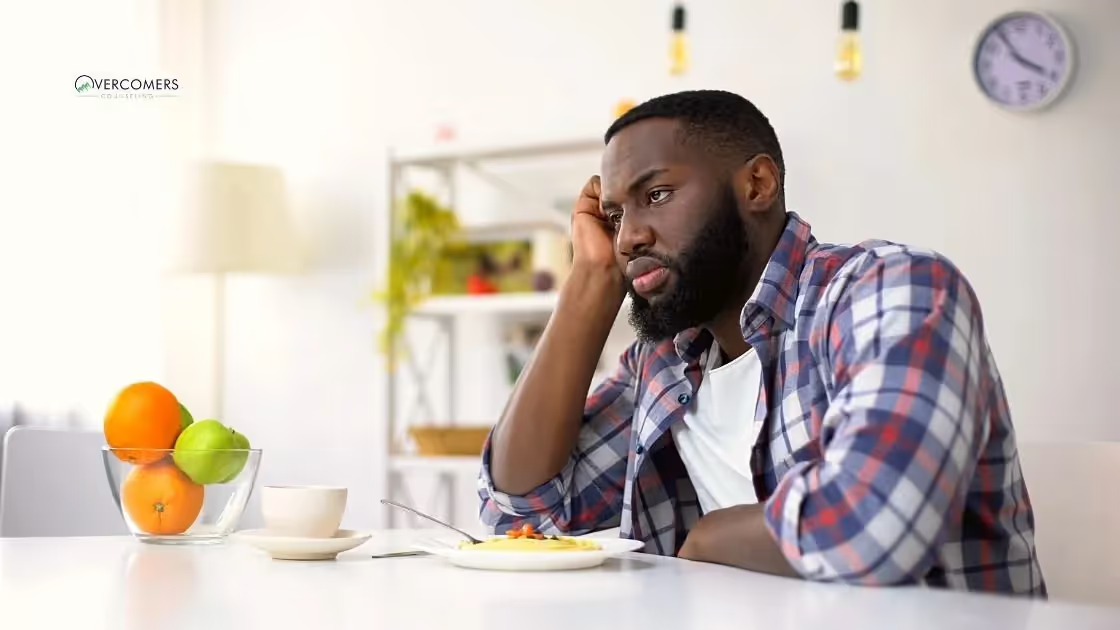There are many side effects of depression-one of which is a decreased appetite. For those who are suffering from depression, it can be difficult to eat the...

There are many side effects of depression-one of which is a decreased appetite.
For those who are suffering from depression, it can be difficult to eat the foods that are best for you and your health.
While this may not seem like a big deal, it can actually be very dangerous because it can lead to malnutrition and other health problems.
However, there are things you can do to increase your appetite and keep your body healthy.
In this blog post, we will discuss the link between depression and loss of appetite, as well as ways you can improve your eating habits.
One of the most common symptoms for people with depression is a lack of interest in activities that they once enjoyed.
This can mean missing out on preparing or eating food, which has a significant impact on your mood if you're not careful!
Cooking and eating may seem like a heavy task when you are feeling depressed.
Depression often leads to an increase in anxiety, which can make people feel sick with gastrointestinal symptoms like nausea and diarrhea, or abdominal pain.
Many people experience depression and feel like there is no hope for them.
They may not eat or drink anything, which can lead to even more problems as it starts becoming harder on the body.
Depression often makes people feel as though they don't like themselves and their health doesn't matter.
They may also believe that if things get worse, then maybe eating or feeling better won't be possible for them either way.
The foods that you eat can have a huge effect on your mood. Some studies show particular types of food, like vegetables and nuts or fish, for example, may help to boost creativity.
Foods that are rich in folic acid, including avocado and spinach, can help boost your mood because they contain the nutrient known as folate which helps regulate serotonin levels!
Foods that are rich in omega-3 acids, including salmon and tuna can be an excellent way to combat the symptoms of depression.
These healthy fats work by boosting your mood because they increase serotonin production which helps regulate feelings like joy or calmness when you're stressed out!
Some of the best sources for B-12 include animal products, such as eggs and milk. Other great choices include fish; lean meats like pork or beef (especially if they're grass-fed).
Depression can be caused by a lack of essential nutrients like Vitamin C. But, there are plenty of foods you could eat to get your daily dose!
Broccoli is one such food that has been shown in studies as being helpful for people with depression because it's high on the nutrient content scale and also contains glucosinolate which helps fight off inflammation associated with depression symptoms.

Depression and loss of appetite make it hard for someone to feel hungry or full, which might lead them to nutritional deficiency.
A dietitian could help by creating meals that are nutritionally balanced and take your individual needs into account (ease of preparation).
For example, if you're not having any energy then the menu will include easy-to-prepare food items so there isn't too much work on preparing a meal but still provides necessary nutrients needed each day.
With depression and loss of appetite, you should see your doctor if you lose your appetite and have the following symptoms for more than 1-2 weeks:
If depression and loss of appetite have been going on longer than 48 hours or is happening now with no end in sight, be sure to seek help as soon as possible.
If you are suffering from depression and loss of appetite, therapy is a great way to manage depression.
Counseling can be a great way to get your mind back on track and improve psychological well-being.
It's often used as an intervention for people who are struggling with depression and loss of appetite due to other sources such as stress management issues at work.
Just because you have depression and loss of appetite, that doesn't mean you have to suffer in silence.
There are plenty of things you can do to increase your appetite and improve your mood.
Foods that are high in protein and healthy fats can help boost your energy levels and make you feel fuller longer.
Exercise is also a great way to combat depression and increase your appetite.
If these measures don't work, it may be time to see a doctor or a therapist.
They can help you find the right treatment plan for you and get your life back on track.
Have you ever struggled with decreased appetite due to depression? Leave a comment below and let us know how you coped.
https://www.priorygroup.com/blog/depression-and-loss-of-appetite-advice-and-next-steps
https://www.webmd.com/depression/guide/diet-recovery
https://www.everydayhealth.com/hs/major-depression/depressions-effect-on-appetite/
Ignoring depression can exacerbate symptoms and make it more challenging to manage over time. This can result in a negative impact on your personal, professional, and social life, leading to feelings of isolation and even thoughts of self-harm or suicide.
While medication is not always required for managing depression, it can be beneficial in some cases. If you decide that medication is right for you, medications such as antidepressants work by balancing certain brain chemicals involved in regulating moods. Other options include mood stabilizers or antipsychotic drugs which may also prove helpful for certain individuals struggling with symptoms of depression.
Addressing depression is crucial because it can significantly impact your quality of life, overall well-being, and ability to function in daily activities. Left untreated, depression can lead to more severe mental health issues, relationship problems, and physical health complications.
If your symptoms of depression have been persistent and interfere with your daily life, it's important to seek help from a mental health professional. It's also a good idea to get medical advice if you experience any thoughts of self-harm or suicide.
Depression is a mental disorder (a common one) that affects millions of people worldwide. It is characterized by persistent feelings of sadness, hopelessness, and loss of interest in activities once enjoyed.In this section, we will discuss the various types of depression, including major depressive disorder, persistent depressive disorder, and bipolar disorder.Gaining a deeper understanding of your depression is the first step in finding the right treatment and support.
Yes! In fact, it's encouraged that you open up to your therapist so they can gain deeper insight into your individual situation and develop the most effective treatment plan possible that works best for you. Your therapist is there to serve as an unbiased source of support who will respect any thoughts or feelings shared within the session without judgment or criticism.